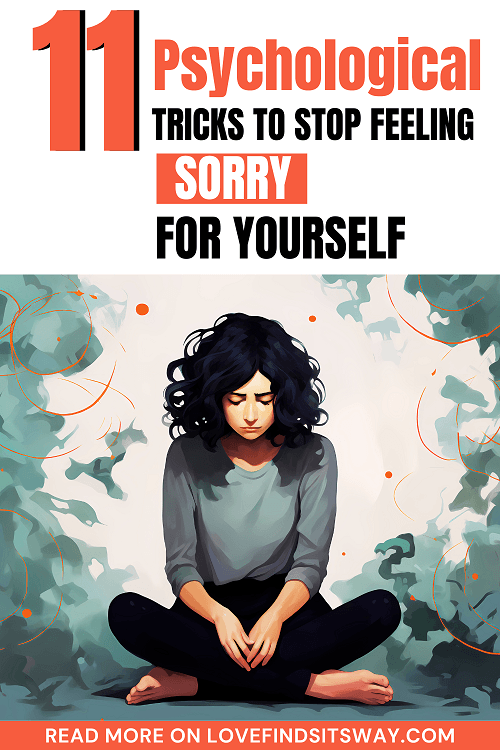How To Stop Feeling Sorry For Others

Ever find yourself emotionally exhausted, constantly burdened by the troubles of others? This deep empathy, while admirable, can lead to compassion fatigue and prevent you from effectively helping anyone, including yourself. We'll explore how to shift from debilitating pity to constructive compassion, offering practical tools and insights for a healthier emotional balance.
Understanding the Trap of Pity
Pity often stems from a sense of superiority or distance. It's a feeling of sorrow for someone, rather than with them. This creates a barrier, hindering genuine connection and effective support.
Compassion, on the other hand, involves understanding and sharing the feelings of another. It motivates action and fosters genuine connection, leading to more meaningful and helpful interactions.
Shifting from Pity to Compassion: A Practical Guide
1. Cultivate Self-Awareness
Start by recognizing your own emotional triggers. What kind of suffering most affects you? Understanding your vulnerabilities allows you to manage your reactions and avoid being overwhelmed.
Journaling can be a powerful tool for self-reflection. Record your thoughts and feelings when you experience strong emotions toward others. This helps identify patterns and understand the root of your reactions.
2. Practice Empathy, Not Sympathy
Empathy is about understanding another person's experience from their perspective. It involves actively listening and validating their feelings, without necessarily agreeing with them.
Instead of saying "I feel sorry for you," try "I can see that you're going through a difficult time." This acknowledges their pain without condescension.
3. Set Healthy Boundaries
You cannot help everyone, and trying to do so will only lead to burnout. Learn to say no to requests that drain your energy or compromise your own well-being.
Establish clear boundaries in your relationships. This means defining what you are and are not willing to do, and communicating those boundaries assertively.
4. Focus on Empowerment, Not Rescue
Instead of trying to fix other people's problems, focus on empowering them to find their own solutions. This involves offering support, guidance, and resources, but ultimately allowing them to take responsibility for their lives.
Ask questions like, "What steps have you already taken to address this?" or "What resources might be helpful to you?" This encourages them to think critically and take action.
5. Practice Self-Care
You cannot pour from an empty cup. Prioritize your own well-being by engaging in activities that nourish your mind, body, and spirit.
This could include exercise, meditation, spending time in nature, or pursuing hobbies. Make self-care a non-negotiable part of your routine.
Productivity Tools for the Compassionate Soul
While the shift from pity to compassion is largely internal, certain tools can facilitate the process. We've compiled a shortlist catering to different needs and budgets:
- Mindfulness Apps (Headspace, Calm): Excellent for cultivating self-awareness and managing emotional reactivity.
- Journaling Apps (Day One, Bear): Provide a structured space for self-reflection and emotional processing.
- Books on Empathy and Boundaries (Daring Greatly by Brené Brown, Boundaries by Henry Cloud and John Townsend): Offer valuable insights and practical strategies.
- Online Courses on Compassion and Emotional Intelligence (Coursera, Udemy): Provide structured learning experiences with expert guidance.
Detailed Reviews
Headspace: Mindfulness for Beginners (Budget-Friendly)
Headspace offers a guided meditation program perfect for beginners. Its user-friendly interface and diverse range of meditations make it easy to incorporate mindfulness into your daily routine. It's a great tool for building self-awareness and managing stress, essential for avoiding compassion fatigue.
Daring Greatly by Brené Brown (Mid-Range)
Brené Brown's Daring Greatly explores the power of vulnerability and its role in building authentic connections. This book provides valuable insights into the importance of empathy and self-compassion, helping you understand and connect with others without being overwhelmed.
Coursera's "Mindfulness and Well-being" Specialization (Premium)
This specialization offers a comprehensive exploration of mindfulness and positive psychology. It provides practical tools and techniques for cultivating self-awareness, managing stress, and building resilience. The structured learning environment and expert guidance make it an excellent investment for long-term personal growth.
Side-by-Side Specs Table with Performance Scores
| Product | Price | Ease of Use | Effectiveness | Value for Money |
|---|---|---|---|---|
| Headspace | $$ | 5/5 | 4/5 | 4/5 |
| Daring Greatly | $$$ | 4/5 | 5/5 | 4/5 |
| Coursera Specialization | $$$$ | 3/5 | 5/5 | 5/5 |
Practical Considerations
Choosing the right tool depends on your budget, learning style, and specific needs. If you're new to mindfulness, Headspace is a great starting point. For a deeper dive into empathy and vulnerability, Daring Greatly is highly recommended. If you're looking for a structured learning experience with expert guidance, the Coursera specialization is an excellent investment.
Remember that these tools are just facilitators. The real work lies in consistently applying the principles of self-awareness, empathy, boundaries, and self-care in your daily life.
Summary
Shifting from pity to compassion is essential for maintaining emotional well-being and fostering genuine connection. This involves cultivating self-awareness, practicing empathy, setting healthy boundaries, focusing on empowerment, and prioritizing self-care. Consider the available resources and choose the ones that best align with your needs and budget.
Ultimately, the goal is to approach others with understanding and support without sacrificing your own well-being. By embracing compassion, you can create a more fulfilling and meaningful life for yourself and those around you.
Take Action Today
Start your journey towards compassionate living by choosing one of the resources mentioned above. Download Headspace, order Daring Greatly, or explore the Coursera specialization. Begin small, be patient with yourself, and celebrate your progress along the way.
Are you ready to transform your empathy into effective compassion? Take the first step today!
Frequently Asked Questions (FAQ)
Q: What's the difference between empathy and sympathy?
A: Empathy is understanding another person's feelings from their perspective, while sympathy is feeling sorry for them. Empathy fosters connection, while sympathy can create distance.
Q: How can I set healthy boundaries without feeling guilty?
A: Remember that setting boundaries is an act of self-care and is essential for maintaining healthy relationships. Communicate your boundaries clearly and assertively, and practice self-compassion when you feel guilty.
Q: What if I can't afford any of these resources?
A: There are many free resources available online, such as guided meditations on YouTube, articles on empathy and boundaries, and support groups. The most important thing is to start with small steps and be consistent in your efforts.
Q: How long does it take to shift from pity to compassion?
A: It's a gradual process that requires consistent effort and self-reflection. Be patient with yourself and celebrate your progress along the way.


















